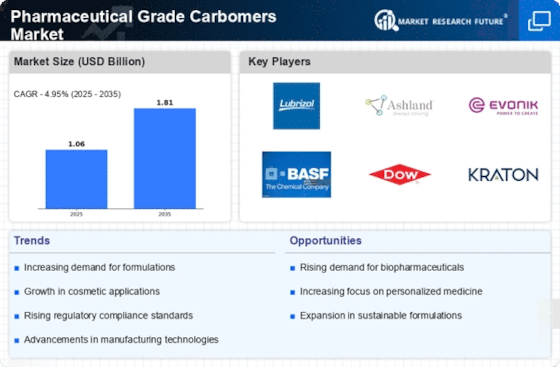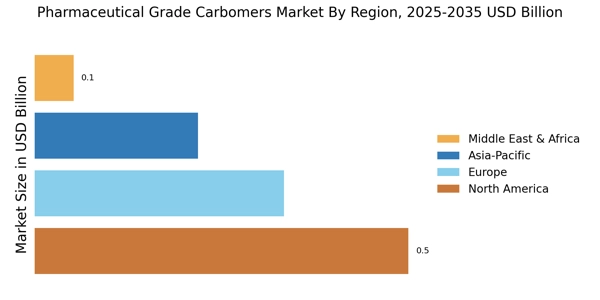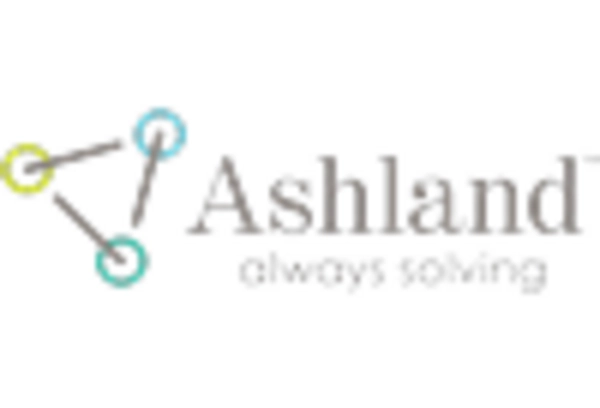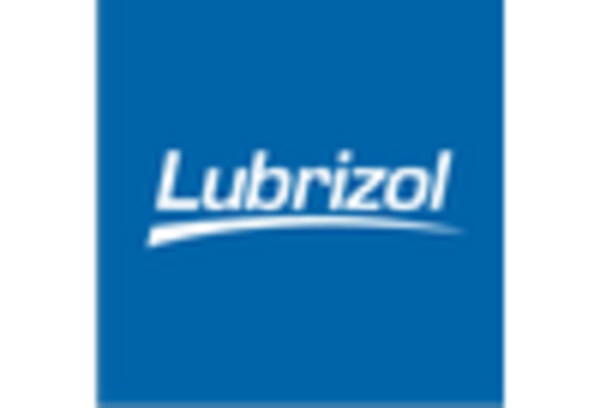Rising Demand for Biopharmaceuticals
The Pharmaceutical Grade Carbomers Market is poised to benefit from the rising demand for biopharmaceuticals. As the biopharmaceutical sector expands, there is an increasing need for effective delivery systems that can enhance the stability and bioavailability of biologics. Pharmaceutical grade carbomers serve as critical excipients in the formulation of biopharmaceutical products, facilitating the development of innovative therapies. The market for biopharmaceuticals is projected to grow at a robust pace, with estimates indicating a potential market size exceeding USD 500 billion by 2027. This growth is likely to create substantial opportunities for pharmaceutical grade carbomers, as they play a vital role in the formulation of these advanced therapies.
Regulatory Support and Standardization
Regulatory support and standardization are emerging as key drivers in the Pharmaceutical Grade Carbomers Market. Regulatory bodies are increasingly recognizing the importance of high-quality excipients in pharmaceutical formulations, leading to the establishment of stringent guidelines for the use of carbomers. This regulatory framework not only ensures product safety and efficacy but also encourages manufacturers to invest in research and development. As compliance with these regulations becomes paramount, the demand for pharmaceutical grade carbomers is expected to rise. The market is likely to benefit from enhanced trust and credibility among consumers and manufacturers alike, fostering a more robust industry landscape.
Increasing Applications in Pharmaceuticals
The Pharmaceutical Grade Carbomers Market is experiencing a notable increase in applications across various pharmaceutical formulations. These carbomers are utilized as thickening agents, stabilizers, and emulsifiers in topical gels, creams, and ointments. The versatility of carbomers allows for enhanced drug delivery systems, which is crucial in the development of effective pharmaceutical products. As the demand for innovative drug formulations rises, the market for pharmaceutical grade carbomers is projected to grow significantly. Recent estimates suggest that the market could reach a valuation of approximately USD 1 billion by 2026, driven by the expanding pharmaceutical sector and the need for high-quality excipients.
Technological Advancements in Manufacturing
Technological advancements in the manufacturing processes of pharmaceutical grade carbomers are playing a pivotal role in the Pharmaceutical Grade Carbomers Market. Innovations in production techniques are leading to improved quality, consistency, and cost-effectiveness of carbomers. Enhanced manufacturing capabilities allow for the development of specialized carbomers tailored to specific pharmaceutical applications, thereby expanding their utility. As manufacturers adopt more sophisticated technologies, the market is likely to witness a surge in the availability of high-purity carbomers, which are essential for meeting stringent regulatory standards. This evolution in manufacturing is expected to drive market growth and foster competition among key players.
Growth in the Cosmetic and Personal Care Sector
The Pharmaceutical Grade Carbomers Market is also benefiting from the growth in the cosmetic and personal care sector. These carbomers are increasingly used in formulations for skincare, haircare, and makeup products due to their ability to enhance texture and stability. The rising consumer preference for high-performance cosmetic products is likely to propel the demand for pharmaceutical grade carbomers. Market analysis indicates that the personal care segment could account for a substantial share of the overall market, with projections suggesting a compound annual growth rate of around 5% over the next few years. This trend underscores the importance of pharmaceutical grade carbomers in meeting consumer expectations for quality and efficacy.

















